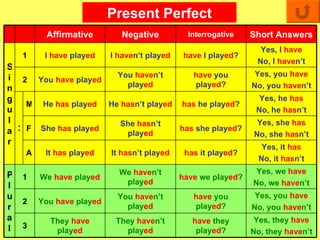Afirmative.
Have.
I have+Participle past or verb ed/We have+Participle past or verb ed/You Have +Participle past or verb ed/They have+Participle past or verb ed
Has.
She has+Participle past or verb ed/He has+Participle past or verb ed/It has+Participle past or verb ed
Negative.
Have.
I have not +Participle past or verb ed/We have not+Participle past or verb ed/You Have not +Participle past or verb ed/They have not +Participle past or verb ed
I haven`t +Participle past or verb ed/We haven`t +Participle past or verb ed/You Haven´t +Participle past or verb ed/They haven`t +Participle past or verb ed/
Has.
She has not+Participle past or verb ed/He has not+Participle past or verb ed/It has not+Participle past or verb ed/
She hasn´t +Participle past or verb ed/He hasn´t +Participle past or verb ed/It hasn´t +Participle past or verb ed
Interrogative.
Have.
Have I+Participle past or verb ed/Have We+Participle past or verb ed/ Have You +Participle past or verb ed/Have They+Participle past or verb ed
Has.
Has She+Participle past or verb ed/Has He+Participle past or verb ed/Has It+Participle past or verb ed
Use.
Point out actions or events that happened in the past thense, but are still relevant in the present
Irregular verbs.
There are irregular vervs that have specific past participle forms

Comentarios
Publicar un comentario